Hind Rustom
( b . 1931)
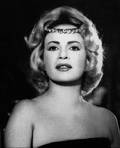
Hind Rustom
(b. 1931)
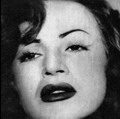
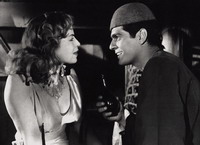
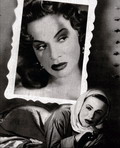
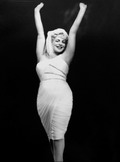
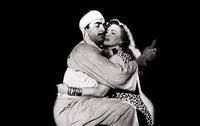
Born in Moharrem Bey in Alexandria, Hind Hussein Mourad Rustom was destined to a childhood of wandering, as her parents got divorced and her father, a police officer, was posted in various cities in Egypt. She did not continue her education at St. Vincent de Paul School in Alexandria for that reason, moving to Cairo with her father for five years, then to Mansoura, Senbelwein, Zagazig, and Darb Negm. They finally returned to Cairo in 1946, when she was fifteen, hardly aware that an acting career was in store for her.
It all started when she went with a friend to el Aflam el Motaheda Company to take a screen test. She had no hope or intention at all of becoming an actress, but had gone simply to see her favourite stars. While there, she was asked to play a small part in Flowers and Thorns (Azhâr wa achwâk). And so she was launched on her acting career, to which her father objected strongly, but which her mother supported.
When she married the director Hussein Reda, he gave her the supporting lead role in Reason is Bliss (el ‘Aql zînah) in 1950. The film’s failure made her go back to small parts again. In 1954, as he was shooting The Unjust Angel (el Malâk el zâlim), Hussein el Emam noticed the girl who was playing the role of a singer and, after consulting with the producer Mary Queeny and the actor Hussein Riad, decided to let her act in Call Girls (Banât el layl). The film was such a success that el Emam gave Hind Rustom parts in two films in 1955. She had finally become a star, on a par with Faten Hamama, Magda and Shadia.
After she was “rediscovered” by el Emam, Rustom worked with directors Salah Abou Seif and Ezz Eddine Zoulficar. Her rendering of the part of a poor girl in Cairo Station (Bâb el hadîd) directed by Youssef Chahine in 1958 was so splendid that it won international acclaim when the film was shown in Hollywood in 1990. In a book about the sex symbols in the American cinema, Brigitte Bardot was chosen from the European cinema, and Hind Rustom from the Arab cinema, for inclusion in the chapter on non-American actresses. Abdel Ghani Daoud claims that “Hollywood critics at that time extolled her accomplishments and natural gifts which, according to them, allowed her to rival the best actresses of the age”.
After starring in Shafiqa the Copt (Shafiqah el qibtiyyah) in 1963, Rustom’s acting and choice of parts took a different direction. She was awarded Best Actress by the Association of Egyptian Cinema Writers and Critics for her part in The Coward and Love (el Gabân wal houbb) in 1975. This was the only award that she accepted throughout her life because she believed “it was sincere”. She retired after that film, voicing dissatisfaction with the state of cinema. She got married to Professor Mohamed Fayyad and turned all her attention to her family and volunteer work, taking part in one last film in 1979, My Life is Torture (Hayâtî ‘adhab).
Filmography:
1945: Laila, Daughter of the Poor (Laila bint el foqarâ’)
1947: Flowers and Thorns (Azhar wa achwâk)
1947: The Father (el Abb)
1947: The Great Sacrifice (el Tadheyah el koubrâ)
1948: The Spirit and the Body (el Rouh wa-l-gasad)
1949: According to your Budget (‘Ala 'ad lihâfak)
1949: Gawaher (Gawâhir)
1950: Reason is a Blessing (el ‘Aql zînah)
1950: Daddy Amin (Bâbâ Amîn)
1953: The Hell of Jealousy (Gahîm el ghîrah)
1953: The Road to Happiness (Tarîq el sa’adah)
1954: The Triumph of Love (Intisâr el houbb)
1954: Hearts of People (Qouloub el nâs)
1954: Daughters of Eve (Banât Haww')
1954: The Unjust Angel (el Mâlâk el zâlim)
1954: People Come in Different Ranks (el Nâs maqâmât)
1954: The Swindler (el Mouhtâl)
1954: Women Cannot Lie (el Sittât mây’rafouch yikdibou)
1954: It Happened One Night (Hadatha dhâta laylah)
1955: Confessions of a Wife (I'tirafât zawgah)
1955: Call Girls (Banât el Layl)
1955: The Body (el Gasad)
1957: You are my Love (Anta habîbî)
1957: The Great Love (el Houbb el ‘adhîm)
1957: Ibn Hamido (Ibn Hamido)
1957: A Struggle with Life (Sirâ’ ma’ el hayât)
1957: Nights without Sleep (Lâ anâm)
1957: Lovers of the Night (Oshak El-Leil)
1957: I Claim my Heart Back (Roudda qalbî)
1958: Cairo Station (Bâb el hadîd)
| 1958: Cairo Station (Bâb el hadîd) |
1958: Ismail Yassin in the Mental Hospital (Ismâ'’îl Yâsîn fi moustachfa el magânîn)
1958: The Charmer of Women (Sâhir el nisâ'’)
1958: Touha (Touhah)
1958: A Mercy from God (Rahmah min el samâ'’)
1958: Awatef (‘Awâtif)
1958: The Elder Brother (el Akhkh el kabîr)
1958: The Silent Love (el Houbb el sâmit)
1959: A Struggle in the Nile (Sirâ'’ fi-l Nîl)
1959: Love Crime (Garîmat houbb)
1959: Thinking of the One who has Forgotten Me (Bafakkar fi-llî nâsînî)
1959: The Inn of Surprises (Loukândat el moufaga'ât)
1959: Kiss Me in the Dark (Qabbilnî fi-l-zalâm)
1959: The Last Love (el Houbb el Akhîr)
1959: Between Earth and Sky (Bayn el samâ'’ wa-l-ard)
1960: A Man With no Heart (Ragoul bilâ Qalb)
1960: Men in the Storm (Rigâl fi-l-’âsifah)
1960: Love and More Love (Houbb fi houb)
1960: Women and Wolves (Nesâ'’ wa dhî'âb)
1960: A Rumour of Love (Ichâ’at houbb)
1961: Tomorrow is Another Day (Ghadan yawmouun âkhar)
1961: The Road of Heroes (Tarîq el abtâl)
1961: The Adult Teenager (el Mourâheiq el kabîr)
1961: Blood on the Nile (Dimâ'’ ‘ala el Nîl)
1961: The Prettiest Girl (Sitt el banât)
1963: Shafiqa, the Copt (Shafeka Al-Kebteya)
1963: A Woman Set Aside (Imra'a ‘alâ el hâmich)
1964: The Confessions of a Husband (I’tirâfât Zowg)
1965: Eternal Love (el Houbb el khâlid)
1965: The Nun (el Râhibah)
1965: The Custody (el Wadi’ah)
1966: Three Thieves (Thalâthat lousous)
1966: Devils of the Night (Chyâtîn el layl)
1966: Adam's Apple (Touffâhat Adam)
1966: The Single Husband (el Zawg el ‘âzib)
1966: Women and Him (Houwa wa-l-nisâ'’)
1966: Sayed Darwich (Sayyed Darwich)
1966: A Man and Two Women (Ragoul wa Imra'atân)
1967: The Second Groom (el ‘Arîs el thânî)
1967: Out of Paradise (el Khouroug min el gannah)
1969: Pretty Aziza (al Hilwah ‘Azîzah )
1971: The Queen of the Night (Malikat el layl)
1971: My Pretty Teacher (Moudarrisatî el hasnâ'’)
1972: Den of the Wicked (Waker el achrâr)
1972: Word of Honour (Kalimat Charaf)
1973: Desire and Loss (el Raghbah wa-l-dayâ’)
1973: The Greatest Child in the World (‘Aazam ttefl fi-l-’âlam) Lebanon
1974: Me, My Daughter and Love (Anâ wa ibnatî wa-l-houbb)
1974: What a Strange World! (‘Agâyib yâ zaman)
1975: The Coward and Love (el Gabân wa-l-houbb)
1979: My Life is a Torture (Hayâtî ‘adhâb)
References:
- Daoud, Abd el Ghani. Madâres el Adâ'’ el Tamthîlî fî târîkh el Cinema el Misreyah. Cairo: El Hay’a el ‘Aama li Qosour el Thaqâfah, 1997.
- _______.____________. Hind Rustom: el Tariq ela el Nogoumiyah. Cairo: Cairo International Film Festival, 1999.
- Kassem, Mahmoud. Mawsou‘at el Momathel fi-l-Cinema el ‘Arabiya. Cairo: Maktabet Madbouli, 2004.

